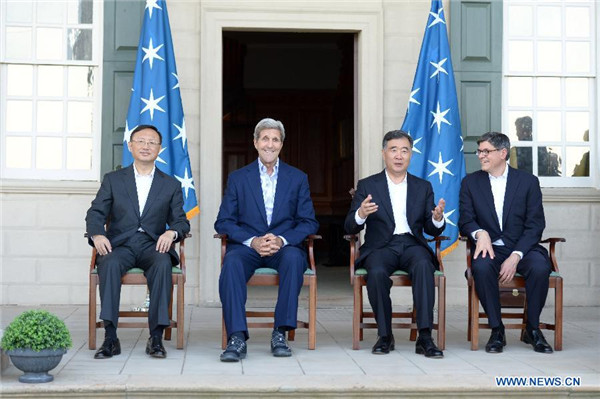

 |
| Chinese Vice-Premier Wang Yang (2nd R), Chinese State Councilor Yang Jiechi (1st L), US Secretary of State John Kerry (2nd L) and US Treasury Secretary Jacob Lew pose for photos at Mount Vernon, the home of first US President George Washington, in Virginia, the United States, on June 22, 2015. [Photo/Xinhua] |
WASHINGTON, June 22 -- Chinese Vice Premier Wang Yang said Monday that the China-U.S. Strategic and Economic Dialogue (S&ED) has helped the world's two largest economies identify and expand common interests and strengthen bilateral relations.
In an op-ed carried by The Wall Street Journal, Wang said the key China-U.S. dialogue has helped the two countries effectively manage differences and minimize their impact on bilateral relations, and also helped U.S. leaders and the public learn more about 21st-century China.
The dialogue is a sign of the growing maturity of China-U.S. relations, Wang said, noting that bilateral trade has doubled over the past nine years and China has become one of the fastest-growing export markets for the United States.
Over the past six years, direct investment from Chinese companies to the United States has increased fivefold, creating more than 80,000 jobs across the country, he said, adding that there's significant room for growth if there are fewer obstacles to Chinese investment in the United States.
"The convergence of interests has gone beyond many people's imagination. It is now such that neither could afford noncooperation or confrontation," he noted.
Wang said the dialogue has played a critical role in kick-starting negotiations on a China-U.S. bilateral investment treaty that had been stalled since 1982.
The two countries reached a breakthrough in treaty talks at the 2013 S&ED meetings after agreeing to conduct negotiations on the basis of pre-establishment national treatment with a negative list approach.
The two sides pledged at last year's S&ED meetings to resolve core issues and major provisions of the treaty by the end of 2014 and to initiate negotiations on the negative list, which specifies sectors and items barred to each other's investment, in early 2015.
The investment treaty will also be high on the agenda of this year's S&ED meetings, set to kick off Tuesday in Washington, after the two sides exchanged initial negative list offers earlier this month.
Experts are optimistic that the two countries could finish the treaty talks under the Obama administration, but ratification might have to wait until after the 2016 U.S. presidential election.
The treaty will help address a number of investment concerns between the United States and China, and investors from both countries will get better access to each other's markets, cementing the foundation of China-U.S. economic ties.
Wang said this year's S&ED meetings are of particular significance as it will lay the groundwork for Chinese President Xi Jinping's state visit to the United States in September.
The Chinese vice premier also said he is looking forward to engaging in candid discussions with U.S. colleagues to achieve broader consensus, better solutions and mutual success.
 Students take graduation photos in ancient costumes
Students take graduation photos in ancient costumes Forbidden City collects evidence from nude photo shoot
Forbidden City collects evidence from nude photo shoot Dragon boat race held to celebrate upcoming Duanwu Festival
Dragon boat race held to celebrate upcoming Duanwu Festival  Chinese students learn Duanwu customs in Hefei, Anhui
Chinese students learn Duanwu customs in Hefei, Anhui Abandoned village swallowed by nature
Abandoned village swallowed by nature Graduation: the time to show beauty in strength
Graduation: the time to show beauty in strength School life of students in a military college
School life of students in a military college Top 16 Chinese cities with the best air quality in 2014
Top 16 Chinese cities with the best air quality in 2014 Mysterious “sky road” in Mount Dawagengzha
Mysterious “sky road” in Mount Dawagengzha Dialogue key to set future China-US course
Dialogue key to set future China-US course New PLA campaign targets new recruits: Land Force
New PLA campaign targets new recruits: Land Force Migrant workers encouraged to start own firms
Migrant workers encouraged to start own firms New route for Indian pilgrims hailed as sign of warming ties
New route for Indian pilgrims hailed as sign of warming tiesDay|Week